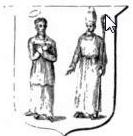
John Guthrie (Bishop of Ross)
Encyclopedia

Kingdom of Scotland
The Kingdom of Scotland was a Sovereign state in North-West Europe that existed from 843 until 1707. It occupied the northern third of the island of Great Britain and shared a land border to the south with the Kingdom of England...
prelate
Prelate
A prelate is a high-ranking member of the clergy who is an ordinary or who ranks in precedence with ordinaries. The word derives from the Latin prælatus, the past participle of præferre, which means "carry before", "be set above or over" or "prefer"; hence, a prelate is one set over others.-Related...
, who was sometime Bishop of Ross
Bishop of Ross
The Bishop of Ross was the ecclesiastical head of the Diocese of Ross, one of Scotland's 13 medieval bishoprics. The first recorded bishop appears in the late 7th century as a witness to Adomnán of Iona's Cáin Adomnáin. The bishopric was based at the settlement of Rosemarkie until the mid-13th...
, an office based at Fortrose
Fortrose
Fortrose is a burgh in the Scottish Highlands, located on the Moray Firth, approximately ten kilometres north east of Inverness. The town is known for its ruined 13th century cathedral, and as the home of the Brahan Seer. In the Middle Ages it was the seat of the bishopric of Ross...
on the Black Isle
Black Isle
The Black Isle is an eastern area of the Highland local government council area of Scotland, within the county of Ross and Cromarty. The name nearly always includes the article "the"....
in Ross
Ross
Ross is a region of Scotland and a former mormaerdom, earldom, sheriffdom and county. The name Ross allegedly derives from a Gaelic word meaning a headland - perhaps a reference to the Black Isle. The Norse word for Orkney - Hrossay meaning horse island - is another possible origin. The area...
.
He received papal provision to the vacant bishopric of Ross by papal bull
Papal bull
A Papal bull is a particular type of letters patent or charter issued by a Pope of the Catholic Church. It is named after the bulla that was appended to the end in order to authenticate it....
on 11 April 1492, his proctor
Proctor
Proctor, a variant of the word procurator, is a person who takes charge of, or acts for, another. The word proctor is frequently used to describe someone who oversees an exam or dormitory.The title is used in England in three principal senses:...
paying the papacy the 600 gold florin
Italian coin florin
The Italian florin was a coin struck from 1252 to 1533 with no significant change in its design or metal content standard. It had 54 grains of nominally pure gold worth approximately 200 modern US Dollars...
s on 14 June. Earlier, at some point between 12 May 1490, and 26 February 1492, he had been admitted to the temporalities
Temporalities
Temporalities are the secular properties and possessions of the Christian Church. It is most often used to describe those properties that were used to support a bishop or other religious person or establishment. Its opposite description would be the spiritualities.In the Middle Ages, the...
of that episcopal see
Episcopal See
An episcopal see is, in the original sense, the official seat of a bishop. This seat, which is also referred to as the bishop's cathedra, is placed in the bishop's principal church, which is therefore called the bishop's cathedral...
, presumably as bishop-elect.
One early modern authority who may have seen lost sources claimed that Guthrie had died before July 1494, though no successor to the dioceseis known until 10 September 1497.

